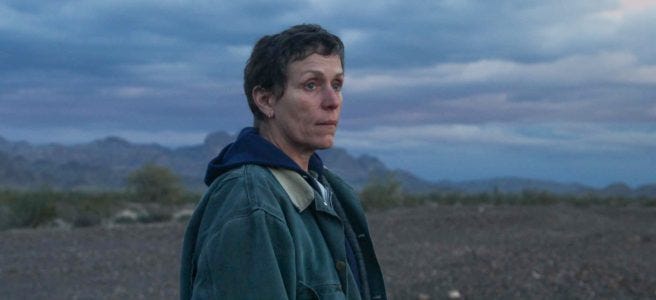NYFF: Notes on Nomadland
The Rider, Chloe Zhao's second feature, was one of my Top 5 movies of 2018. In my mind, it was a perfect balance of character and theme. It artfully and empathetically tells the story of Brady Blackburn (Brady Jandreau) a cowboy who must try to find a new purpose in life after a head injury robs him of the thing most meaningful in his life--riding horses. At the same, The Rider incisively examines American masculinity and the ways in which it defines and limits the lives of so many men.
The great challenge for Nomadland is try to strike the same balance. Here our protagonist is a woman, Fern, who is an American nomad, living out of her van. She is not homeless, but rather "houseless" choosing a life of freedom over one of stability and community. The movie opens with Fern arriving in a town to to take up her annual Christmas seasonal work of packing boxes for Amazon. Like The Rider, Nomadland makes use of a wide variety of non-professional actors who seem to be playing loose versions of the themselves (though unlike The Rider where Brady Jandreau plays a version of himself, Frances McDormand plays the main character Fern). Additionally, as with The Rider, place plays a central role in contextualizing the characters and their experiences in Nomadland. The mountains and deserts of the west set the tone for a group of characters who are both rugged individualists and members of a special community who help each other in times of need.
However, unlike The Rider, the balancing act of character and theme is already out whack at the start of the movie. First, much of the opening 30 minutes takes place in and around an actual Amazon warehouse, amounting to a major product placement that portrays Amazon as a generous benefactor giving these nomads important opportunities to work.
Second, the movie does little to explore the politics of these groups and the ways they may or may not conflict. Some characters are hippies, seemingly falling on the left-end of the political spectrum, while others feel more like the bikers and boaters often associated with being on the right-end of the spectrum. But surprisingly, everyone seems to get along well, and there's not a single Trump flag to be seen (though one character has a Confederate flag tattoo). If these groups are in conflict in the campgrounds and RV parks of the west, it seems that would be worth exploring. And if, like the movie portrays, all of these groups find ways to get along, then it would be great to know the secret, because we could sure use a little more of that in the rest of the country.
Third, and more importantly, Fern's life as a nomad is one of choice (largely brought on by the death of her husband). Though the movie acknowledges that not everyone lives this life by choice, it doesn't really explore the socioeconomic factors that cause so many Americans to van or RV hop across the west finding seasonal work. In fact, when Fern's van breaks down, she borrows thousands of dollars from her sister to fix it. The movie does have a great scene where Fern and her friends take a tour of a huge RV far beyond their means, but overall it largely sidesteps the chance to really interrogate the factors that force so many people to live the nomad lifestyle.

Nevertheless, the first third of the movie creates a compelling community that draws us in as we meet colorful characters who feel real. Their unique faces and direct delivery make them eminently likable, and their mix of self-sufficiency and compassion for each other is sure to awaken a combination of minimalism and wanderlust that these romantic characters represent.
But as the movie progresses, that community and those characters are left behind in favor of a more typical psychological examination of why Fern chooses to be a nomad and pushes away the people who try hardest to connect with her, including her sister and a friend Dave (David Strathairn), who has romantic feelings for Fern. As a result, the social themes are left behind, and the movie shifts into a more typical Hollywood gear, exploring Fern's fear of community, commitment, and settling down. All of this leads her to revisit the town of Empire, Nevada where her husband died and which itself eventually died after the closing of the gypsum mine where he worked. Fern wanders through her own former house, in contemplation of what she has lost. Instead of an incisive examination of capitalism and its social impacts, the movie settles on the more typical Hollywood formula of a character facing her inner conflicts and fears and seemingly coming out better as a result (though whether she has chosen community or freedom is left somewhat open).
All of this may seem like a harsh assessment of a move receiving rave reviews. It's not meant to be. The movie is beautifully shot and honestly and openly acted by a superb ensemble of professional and professional actors (one of which will probably win her 2nd Oscar). And as far as Oscar-style movies go, Nomadland executes well. But I can't help but feel that Nomadland missed a golden opportunity to dig deeper into the many cracks of capitalism, and instead settled on the lower hanging fruit of personal melodrama.


